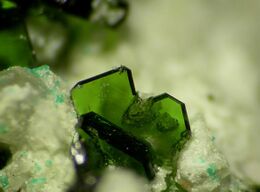Chemistry:Lindgrenite
From HandWiki
Short description: Copper molybdate mineral
| Lindgrenite | |
|---|---|
 Lindgrenite specimen from the San Samuel Mine of the Cachiyuyo de Llampos district, Copiapó Province, Atacama Region, Chile (field of view 4 mm) | |
| General | |
| Category | Molybdate mineral |
| Formula (repeating unit) | Cu3(MoO4)2(OH)2 |
| Strunz classification | 7.GB.05 |
| Dana classification | 48.3.1.1 |
| Crystal system | Monoclinic |
| Crystal class | Prismatic (2/m) (same H-M symbol) |
| Space group | P21/n |
| Unit cell | a = 5.394, b = 14.023 c = 5.608 [Å]; β = 98.5°; Z = 2 |
| Identification | |
| Color | Green to yellowish green |
| Crystal habit | Tabular to platey crystals, may be acicular, massive or crust forming |
| Cleavage | Perfect on {010} and {101}, poor on {100} |
| Fracture | Micaceous |
| Tenacity | Brittle |
| Mohs scale hardness | 4.5 |
| |re|er}} | Greasey |
| Streak | Pale green |
| Diaphaneity | Transparent |
| Specific gravity | 4.2 |
| Optical properties | Biaxial (-) |
| Refractive index | nα = 1.930 nβ = 2.002 nγ = 2.020 |
| Birefringence | δ = 0.090 |
| 2V angle | 71° (measured) |
| References | [1][2][3] |
Lindgrenite is an uncommon copper molybdate mineral with formula: Cu3(MoO4)2(OH)2. It occurs as tabular to platey monoclinic green to yellow green crystals.
Discovery and occurrence
It was first described in 1935 for an occurrence in the Chuquicamata Mine, Antofagasta, Chile , and named for Swedish–American economic geologist Waldemar Lindgren (1860–1939) of the Massachusetts Institute of Technology.[1][2]
Lindgrenite occurs in the oxidized portions of copper–molybdenum bearing sulfide ore deposits. Associated minerals include antlerite, molybdenite, powellite, brochantite, chrysocolla, iron oxides and quartz.[1]

References
- ↑ 1.0 1.1 1.2 Lindgrenite in the Handbook of Mineralogy
- ↑ 2.0 2.1 Lindgrenite on Mindat.org
- ↑ Lindgrenite data on Webmineral
- ↑ Warr, L.N. (2021). "IMA–CNMNC approved mineral symbols". Mineralogical Magazine 85 (3): 291–320. doi:10.1180/mgm.2021.43. Bibcode: 2021MinM...85..291W.
Further reading
- Calvert, L. D.; Barnes, W. H. (1957). "The structure of Lindgrenite". Can Mineral 6 (1): 31–51. http://canmin.geoscienceworld.org/content/6/1/31.extract.
- Xu, Jiasheng; Xue, Dongfeng (2007). "Hydrothermal synthesis of lindgrenite with a hollow and prickly sphere-like architecture". Journal of Solid State Chemistry 180 (1): 119–126. doi:10.1016/j.jssc.2006.09.030. Bibcode: 2007JSSCh.180..119X.
- Vilminot, Serge; André, Gilles; Richard-Plouet, Mireille; Bourée-Vigneron, Françoise; Kurmoo, Mohamedally (2006). "Magnetic Structure and Magnetic Properties of Synthetic Lindgrenite, Cu3(OH)2(MoO4)2". Inorganic Chemistry 45 (26): 10938–46. doi:10.1021/ic061182m. PMID 17173452.
- Frost, Ray L.; Duong, Loc; Weier, Matt (2004). "Raman microscopy of the molybdate minerals koechlinite, iriginite and lindgrenite". Neues Jahrbuch für Mineralogie - Abhandlungen 180 (3): 245. doi:10.1127/0077-7757/2004/0180-0245. https://eprints.qut.edu.au/23725/1/Raman_microscopy_of_the_molybdate_minerals_koechlinite_iriginite_and_lindgrenite.pdf.
- Kingsbury, Arthur W. G. (1955). "On the Occurrence of the Rare Copper Molybdate, Lindgrenite, at Brandy Gill, Carrock Fell, Cumberland". Mineralogical Magazine 30 (230): 723–726. doi:10.1180/minmag.1955.030.230.06. Bibcode: 1955MinM...30..723K.
- Bao, R; Kong, Z; Gu, M; Yue, B; Weng, L; He, H (2006). "Hydrothermal Synthesis and Thermal Stability of Natural Mineral Lindgrenite1". Chemical Research in Chinese Universities 22 (6): 679. doi:10.1016/S1005-9040(06)60189-X.
- Barnes, W. H.. The unit cell and space group of lindgrenite. http://www.minsocam.org/ammin/AM34/AM34_163.pdf.
- Miyazaki, Iyo; Ohori, Shinji; Kishi, Shigetomo; Kobayashi, Shoichi; Kusachi, Isao (2002). "Lindgrenite from the Sansei mine, Nara Prefecture, Japan". Journal of Mineralogical and Petrological Sciences 97 (4): 207. doi:10.2465/jmps.97.207. Bibcode: 2002JMPeS..97..207M.
 |
